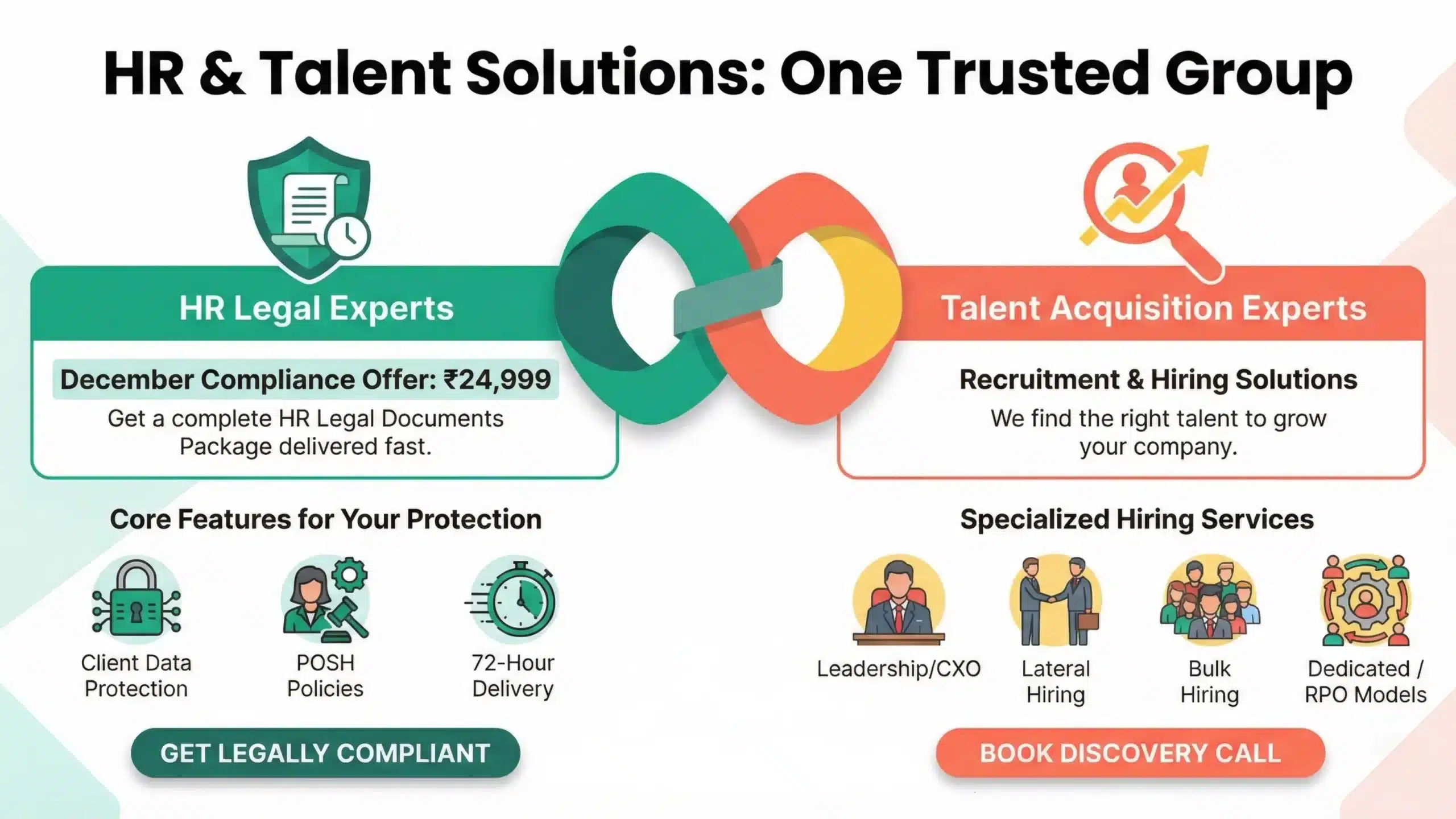Many companies, especially smaller ones, need help with complex HR legal services. It’s not just about data breaches (though those are scary, too!). We’re talking about things like preventing workplace harassment, following the latest sick leave or parental leave regulations, and having clear policies for overtime and vacation time. These things seem simple, but getting them wrong can be a major headache for your business, both financially and reputationally.
After all, no one wants to deal with a lawsuit from a disgruntled employee because you weren’t following the proper protocol for handling a complaint.
The laws are constantly changing, making it challenging to keep up without a dedicated legal team. Even the most well-intentioned business owner can find it difficult. That’s why we’ve compiled a list of the top 12 FAQs to answer your burning HR legal questions.
Table of Contents
ToggleFrequently Asked Questions About HR Legal Services
1. Why should I invest in professional HR legal services?
Investing in professional HR legal services is vital for any business.
But if you want to:
• Lead today’s competition with a strong and compliant workforce.
• Stay ahead of changing laws and regulations that could impact your business.
• Mitigate risks and protect your bottom line from costly legal disputes.
Then HR legal services are for you!
It’s like having a team of experts who help you navigate the complexities of HR and legal issues, such as crafting employment contracts, ensuring compliance with labour laws, and handling sensitive employee disputes.
These professionals create a positive and harmonious workplace for your employees, boosting morale and productivity while minimising legal risks.
Moreover, they tackle complex legal matters and prevent costly disputes for you. So, investing in HR legal services means you are building an efficient and successful organisation.
2. Why should I consider outsourcing HR legal services?
Building an in-house legal team can be expensive. Outsourcing HR legal services gives you access to a pool of specialists without overhead. It offers flexibility and access to a broader range of skills tailored to your business’s needs, ready to tackle your specific HR challenges.
Outsourced HR legal professionals can handle everything from drafting HR handbooks to gratuity policies and handling disputes. Knowing you’ve covered legal compliance frees up your internal team to focus on core business activities.
In most cases, it is an excellent option for cost savings, improved service quality, and implementing best practices in HR management and legal compliance.
3. Why are employment agreements essential for protecting my business?
Employment agreements are the foundation of a healthy employer-employee relationship. They clearly outline everyone’s rights and responsibilities, like job duties, compensation, benefits, confidentiality obligations, and termination conditions. This clarity prevents misunderstandings and potential legal disputes down the road.
This roadmap for a successful work relationship ensures all parties are on the same page with trust and transparency.
A well-crafted employment agreement sets clear expectations for you and your employees, reducing the risk of getting lost or encountering unexpected detours.
4. Why is HR legal compliance critical for long-term business success?
Compliance with HR regulations is the backbone of any successful business.
Just like a house needs a solid structure to stand tall, a business needs compliant HR practices that grow its business. Staying compliant creates a positive work environment, keeps employees happy, and protects your company from legal challenges.
Non-compliance can lead to costly litigation and damaged reputations. Compliance demonstrates your commitment to ethical practices and can even attract top talent.
Compliant HR practices create a work environment that attracts top talent and positions your business for long-term success.
5. Why should employment agreements reflect fair and reasonable terms?
Reflecting fair and reasonable terms in employment agreements is ethical; everyone knows that. But most employers don’t see that it’s also beneficial for retaining talent.
Employees are more likely to feel valued and engaged when their contracts are transparent, fair, and respectful of their rights. By designing fair agreements, businesses can reduce turnover and promote loyalty, as employees feel secure and appreciated.
Additionally, fair agreements minimise the risk of disputes and legal actions, building a positive and transparent workplace culture.
6. Why do employment agreements need to cover probation and notice periods?
Employment agreements should clearly outline probation and notice periods to set expectations immediately.
A probation period allows employers to evaluate a new hire’s performance and fit within the company, typically within a specific timeframe, before confirming their employment status. It’s also an opportunity for employees to see if the job meets their expectations.
Meanwhile, notice periods provide a timeframe for employees to notify the employer if they plan to leave or vice versa. This ensures a smooth transition and minimises workplace disruption.
By clearly defining these periods in the employment agreement, both parties can avoid misunderstandings and enjoy a more structured and harmonious working relationship.
7. Why do employment agreements need confidentiality clauses?
Employment agreements should clearly outline that confidentiality clauses play a crucial role in protecting a company’s sensitive information.
These clauses ensure that employees keep proprietary data, trade secrets, and other confidential info from being shared with outsiders, which could harm the business. Companies can safeguard their competitive edge and intellectual property by including a confidentiality clause.
It also helps build a culture of trust and responsibility among employees, emphasising the importance of keeping certain information private.
Businesses risk data breaches, financial loss, and reputational damage without these clauses. So, confidentiality clauses aren’t just a legal formality—they’re essential for maintaining the security and integrity of a company’s operations.
8. Why is streamlining onboarding processes important for employee engagement?
Onboarding is like the first chapter of a book your new hires are about to read. If that first chapter is exciting and engaging, they’ll be excited to turn to the next page.
By making the onboarding process smooth and well-structured, you’re captivating their interest from the start.
Beyond just paperwork, a well-thought-out onboarding experience introduces employees to the company culture, values, and their role in the bigger picture. It empowers them with the confidence and tools they need to hit the ground running.
When employees start with a clear roadmap and a warm welcome, they are more likely to feel connected, motivated, and committed to their new workplace. This initial engagement sets a lasting tone for their tenure, enhancing productivity and retention in the long run.
9. Why should onboarding processes be tailored to company culture?
Customising the process sets the tone for new hires and helps them integrate more smoothly into the team. Think of it like inviting a friend to a dinner party: you want them to feel comfortable and be part of the conversation.
When onboarding aligns with company culture, it gives new employees a clear picture of what to expect and how to thrive within the organisation. This not only helps retain talent but also boosts morale and productivity.
Tailored onboarding ensures newbies understand the company’s values, goals, and how things get done.
10. Why do I need well-defined leave policies in my organisation?
Having well-defined leave policies in your organisation is essential for several reasons. Firstly, clear policies ensure consistency, so all employees understand their entitlements, whether for annual leave, sick days, or parental leave.
This transparency helps to avoid confusion and potential disputes. Secondly, it supports compliance with employment laws, protecting you from legal complications. Additionally, well-structured leave policies contribute to a positive workplace culture, boosting employee satisfaction and productivity by showing that you value their well-being.
Finally, these policies aid in workforce planning, allowing you to manage absences effectively and maintain business continuity. In short, well-defined leave policies are a win-win for employers and employees.
11. Why should maternity, sick, and vacation leave policies be clearly defined?
Establishing clear and transparent policies for maternity, sick, and vacation leave is essential for a supportive workplace environment. Employees can better manage personal and professional responsibilities when they know their entitlements. This transparency builds trust and reduces misunderstandings or conflicts.
Well-defined leave policies ensure legal compliance, prevent legal issues for employers, and improve workflow efficiency. Both employees and managers can handle leave requests more smoothly.
In summary, clear leave policies benefit the organisation and its employees, creating a harmonious and productive workplace.
12. Why should I prioritise developing effective harassment policies?
Implementing effective harassment policies is a game-changer for any business. These policies create a safe and respectful workplace, which is essential for boosting employee morale and productivity.
Clearly defining unacceptable behaviour and outlining consequences helps prevent workplace harassment and mitigate risks. This transparency protects your employees and shields your company from potential legal issues. Moreover, robust harassment policies show your commitment to an inclusive and supportive culture, making your organisation a magnet for top talent.
In short, strong harassment policies enhance workplace safety, elevate employee satisfaction, and provide vital legal protection for your business.
HR Legal Services are must
HR legal services are crucial for any business navigating employment laws and regulations. Well-defined leave policies can foster a positive workplace culture and simplify workforce planning.
Additionally, tailored and streamlined onboarding processes significantly boost employee engagement, retention, and overall productivity. Integrating these HR strategies creates a transparent, supportive, and legally compliant work environment.
Implementing HR legal frameworks can be challenging and time-consuming. That’s where Corporate Stalwarts’ HR legal services come in. With our extensive experience and commitment to excellence, we are your trusted partner for HR legal services. Let us handle the complexities of legal compliance so you can focus on growing your business.
Contact HR Legal Experts today to ensure your organisation thrives with the support of seasoned HR professionals.

Corporate Stalwarts is a trusted recruitment firm with 20+ years of expertise in executive search and leadership hiring.
We’ve placed 10,000+ candidates across 600+ companies in FMCG, Manufacturing, IT, Pharma, and more. Our 1M+ candidate pool and 48-hour turnaround enable fast, high-quality hiring solutions.
We help businesses build high-performance teams with precision, speed, and industry expertise.




